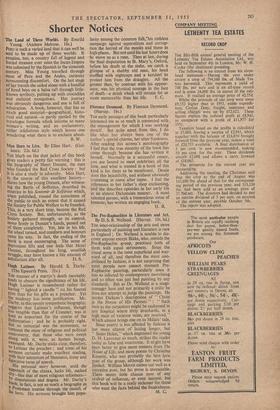Hugh Latimer. By Harold S. Darby. (The Epworth Press. 21s.)
THE manner of a martyr's death inevitably tends to obscure the significance of his life. Pugh Latimer is remembered rather for having " lighted a candle " on his funeral Pyre than for his gifts as a preacher. Yet the tendency has some justification. Mr. Darby, in this openly sympathetic biography, suggests that Latimer's influence, though less tangible than that of Cranmer, was at least as important for the course of the Reformation ; and he is probably right. But so torrential was the movement, so tortuous the maze of religious and political controversy, that those who were swept al°ng with it, were, as human beings, swamped. Mr. Darby sticks close, therefore, to Latimer the preacher ; and some of his sermons certainly make excellent reading, with their admixture of bluntness, irony and figurative turns of speech. His personal story however, until the approach of the climax, lacks life, sucked n—like that of most religious reformers— by disputations and dogma. Mr. Darby's book, in fact, is not so much a biography as !i•Protestant treatise through the mouth of his hero. His sermons brought him popu-
larity among the common folk,'his ruthless campaign against superstition and corrup- tion the hatred of the monks and those in high places. But not until his last hours does he move us as a man. Then at last, during the final disputation in St. Mary's, Oxford, before his death at the stake, we catch a glimpse of a shabby old man, his head muffled with nightcaps and a kerchief to protect him from the draughts. All the greater then, by contrast with his appear- ance, was his physical courage in the face of death—a death which will remain for us more memorable than his life. E. C.


































 Previous page
Previous page